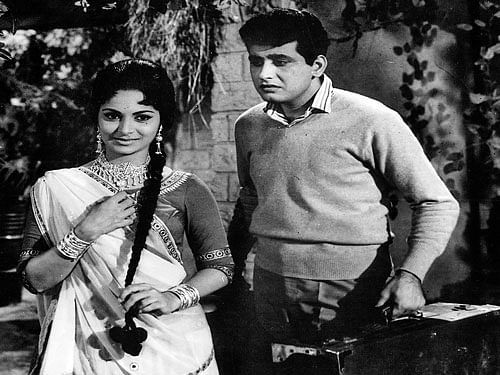
Hari Krishen Goswami, aka Manoj Kumar, has been actor, writer, director, producer, editor and lyricist. And his image as Mr Bharat sticks, though his films and his talent have been much more than just about patriotism. Physically not in top fettle, the 78-year-old veteran’s passion and spirit are still intact. “I am still learning!” he thunders, his eyes piercingly sharp. “The day that stops, a man is finished.”
Manoj was just a nine-year-old when his family was uprooted by Partition from his Punjab village named Jandyala Sher Khan (now in Pakistan). Witness to bloodshed and other traumas, his family lived in a refugee camp on the outskirts of Delhi for two years. “Anything emotional or touching in my scripts was exclusively born from these experiences. My approach to characterisation is a by-product of these memories. I missed schooling for two years, so by the time we settled and I resumed school in Delhi, my fondness for films had been established.”
And so, when Manoj’s cousin, filmmaker Lekhraj Bhakri, had come to Delhi for the premiere of his film Tangewali starring Shammi Kapoor, he met Manoj and said, “You look just like a film hero,” the actor replied, “Make me a hero!” Two months later, with his father’s blessings, Manoj left for Mumbai.
The patriotic tone
Manoj is amused by destiny linking him to patriotism each time. “Incidentally, Tangewali’s premiere was held on January 26, 1956 — Republic Day! My first break in a cameo was as a singing mendicant in my cousin’s 1957 film Fashion, and the song was ‘Maati ko lajaana nahin mera desh hai mahaan’ (Do not be a disgrace to the soil of this great nation)!”
After a long struggle, with a hero’s break in Kanch Ki Gudiya, a tepid success in Hariyali Aur Rasta and a few other films, Manoj’s career really took off with the 1964 thriller Woh Kaun Thi? And the trio of 1965 hits, Himalay Ki God Mein, Gumnaam and Shaheed consolidated his stardom.
Manoj had, by then, already penned a script on Bhagat Singh. “I would professionally ghost-write three or four scenes every week for different films and would be paid Rs 11 per scene,” recalls the actor. “Bhagat Singh was my dream character as an actor. My secretary Kewal P Kashyap was keen on turning producer and was adamant that he would make it, even though there was no heroine.”
Shaheed was a huge hit. “At a particular point in the film, the director was at a loss how to proceed and I took over. And that’s when I realised that direction was the ultimate creative area, the real job,” confesses Manoj.
When Shaheed won a National award, the then-Prime Minister Lal Bahadur Shastri asked Manoj to make a film on his slogan “Jai Jawaan Jai Kisaan”. And so Manoj wrote Upkar, a massive hit that again clinched the National award. “I decided to direct the film myself. Friends discouraged me and said, ‘Everyone can’t be Raj Kapoor. You are doing fine as a hero.’ But I took the plunge,” smiles the star.
Again, destiny took a hand. “I had named my hero Ram, as he was an ideal son. But since he was a farmer, and the real India lives in the villages, I renamed him Bharat,” says the actor. The tag of Mr Bharat stuck to him, and Manoj’s later directorials, Purab Aur Pacchim, Roti Kapada Aur Makaan and Kranti consolidated the image.
A Midas touch
Do Badan, Sawan Ki Ghata, Patthar Ke Sanam, Neel Kamal, Pehchan, Beimaan, Sanyasi and Dus Numbri were his other hits, and Shor, the father-son story, perhaps remains his most-acclaimed film as writer-director in the latter years.
Manoj was called King Midas as all his directorial ventures and most of his acting vehicles were blockbusters. And in 1977, this Shirdi Sai Baba devotee wrote, acted in, presented and reportedly ghost-directed the film Shirdi Ke Sai Baba. With this film, he discovered another facet of his talent — writing lyrics. The two songs he wrote here, “Sainath tere hazaaron haath” and “Sai Baba bolo” just flowed out, he says. In fact, Manoj’s latest tryst with cinema is his writing some songs in the 2010 film on Sai baba, Maalik Ek.
There are some facets of Manoj that are rarely known: his production Painter Babu introduced Meenakshi Seshadri. Anup Jalota was introduced to the world in Shirdi Ke Sai Baba, while Kranti marked the comeback of Manoj’s idol, Dilip Kumar.
Also, not commonly known is the fact that in Mera Naam Joker’s first chapter starring Rishi Kapoor, Simi Garewal and him, Manoj also worked with Raj Kapoor as writer. “The solah baras concept and philosophy were mine, and Raj-saab was big-hearted enough to mention to many people in the film industry that I had a hand in shaping the screenplay,” recollects Manoj.
So, what does Manoj think of cinema today? “Very few films touch the soul and there is barely any music. There are good actors and some good directors though. But I look for good things even today. I may like a director’s cut in one shot, the edit in another, a piece of background music in a third film. As I said, I am still learning.”
He ponders for a while. “Cinema reflects society. There used to be a certain calmness before, now there is sensationalism. The media sensationalises everything, without realising that they are affecting so many innocent lives through this! I wish they had more responsibility,” he signs off.